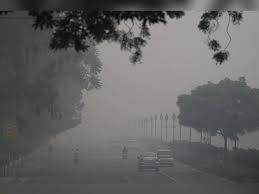Express view on cloud seeding in Delhi: A damp squib.
A week after the Diwali festivities, a thick haze continues to hang over the national capital, and the city’s residents have had little respite from unhealthy air. The Delhi government’s attempt to reduce pollution by inducing artificial rains came to nought on Tuesday. A small aircraft sprinkled silver iodide and salt particles on clouds in parts of Delhi’s sky, but 0.3 mm of rain over Noida and Greater Noida was all that came from the effort. It was apparent that the clouds did not have enough water to pour down over the capital. The Delhi government’s desperation is understandable. The capital’s pollution challenge is complex and deeply entrenched — it requires a multi-pronged effort. In the past, cloud seeding has been used as a drought management tool. But the jury is out on the technique’s efficacy in cleaning toxic air. Scientists had warned that the moisture content of the late autumn clouds would be insufficient to wash away the particulate matter in Delhi’s air. The argument that any relief would, at best, be temporary also did not cut much ice with the Delhi government.
Unlike even a decade ago, there is a wealth of research and publicly available analytical tools that pinpoint the causes of Delhi’s bad air. There might be variations at different locations in the capital, but the major sources of pollution are now well identified. Their relative contributions, as well as their day-night, monthly, or seasonal variations, are also fairly well understood. Data, however, is only an enabler; it must be backed by robust policy. Unfortunately, policymakers have scarcely done better than resorting to quick fixes in the season after Diwali. Poor air quality in Delhi is, however, much more than just a winter problem. Good rainfall, like that experienced by the city this year, does provide respite at times. But Delhi needs its policymakers to be much more proactive, throughout the year, rather than depending on the elements or trying to nudge clouds to produce rain. The Commission for Air Quality Management is mandated to engage with the issue throughout the year. But its approach, too, is piecemeal. Even some of the easy-to-implement municipal solutions, such as sprinkling water to remove dust, have been clouded in controversy.
Even if the cloud-seeding initiative had succeeded, its effects would have been confined to a few areas in the capital. There is very little by way of a broader airshed approach that involves neighbouring states — Haryana, Punjab, Uttar Pradesh. After Tuesday’s failure, the Rekha Gupta government has reportedly put the artificial rain project on hold. It would do well to invest in durable science-backed solutions.
